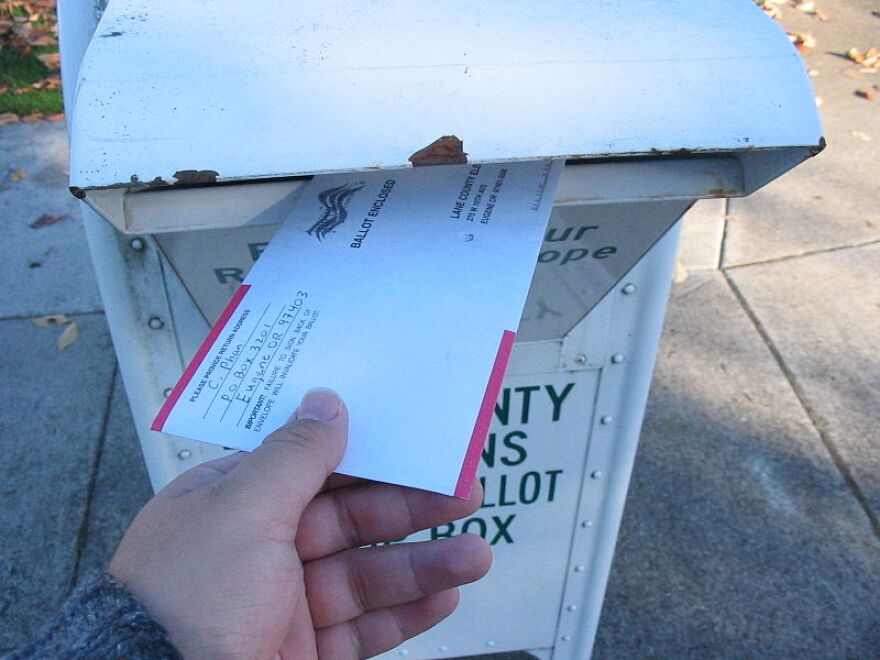This has been – to put it mildly – an unusual presidential election season. And for the first time in many years, Oregon’s May 17th primary could actually make a difference in the outcome at both major party nominating conventions.
But now that the primary is suddenly relevant, a lot of people find themselves confused about how the process works.
Let’s sort it out, shall we?
In most presidential campaign years, each party’s nominee is typically decided by the time the race gets out to the West Coast. So Oregon’s primary is usually pretty much of a snoozer. But Secretary of State Jeanne Atkins says, not this year.
“We have seen in the last two months a lot of party registrations being added or party switches happening,” Atkins says. “People are definitely interested in getting ready for this primary.”
Atkins says the sudden relevance of the primary – plus a flood of newly registered voters from the state’s new Motor Voter law – has definitely livened things up.
“So we’ve been very interested in making sure to get the word out about how to participate.”
In fact, you may have gotten a mailer from Atkins’ office, trying to clarify your options as a primary voter.
Bottom line? If you want to vote in the primary between Hillary Clinton and Bernie Sanders, you’ve got to be registered as a Democrat. Likewise, if you want to weigh in on the Trump/Cruz/Kasich race, you have to be a registered Republican. If you’re not registered with the right party – or if you’re a non-affiliated voter – those candidates will not appear on the ballot you get in the mail. That’s because the Dems and Rs have closed their primaries this year.
Why?
“It’s not a runoff to the general election; it’s a primary,” notes Oregon Republican Party Chair Bill Currier. “It’s an opportunity for each party to put forward what they feel in their best candidate.”
Like his Democratic counterparts, Currier doesn’t think non-party members should help choose the parties’ candidates. So, registered Republicans will get a primary ballot that includes only Republican candidates.
By voting for one of the presidential hopefuls, Republican voters will select delegates who will go to the Republican National Convention in Cleveland, Ohio in July. Those delegates will choose the party’s standard bearer for the general election in November.
Currier says delegates will be awarded proportionally, with a presidential candidate getting one delegate from Oregon for every 3.57 percent of the popular vote that they pick up in the May 17th primary.
At the national convention, delegates have to vote for the candidate they represent on at least the first ballot. After that, the rules get a little complicated. But under certain circumstances, Oregon’s Republican delegates can then be freed to vote for a different candidate than the one they were elected to support.
Then, there are the so-called “super-delegates”, whom the parties prefer to call “automatic delegates” They automatically become delegates because they’re party officials or hold elected office. Bill Currier says he’s one of only three Oregon Republicans who are automatic delegates. And, they’re required to reflect the people’s choice.
“Myself, the national committeeman and the national committeewoman from Oregon are now bound to the top vote-getter in the May 17th primary.”
On the Democratic side, automatic delegates make up a larger portion of the delegates and they are unbound; that is, they can vote for whomever they choose, regardless of the primary results.
This is a very touchy topic for Oregon Democrats. Many Democrats in Washington State recently got furious after Bernie Sanders overwhelmingly won the caucus, but a number of the state’s Democratic super-delegates said they’d cast their vote for Hillary Clinton, regardless. This is such a sore point that Oregon Democratic Party executive director Brad Martin repeatedly declined to talk on the record about anything having to do with the Democratic primary.
So, in the big picture, how significant will Oregon’s presidential primary really be? University of Oregon political science professor Joseph Lowndes says, considering the relatively small number of delegates in play, the influence may be mostly about perceptions among voters and pundits.
“As we get closer to the conventions,” Lowndes says, “as it looks as though each convention may get contested, each state becomes less important for the number of delegates and more important for the intensified symbolism.”
Lowndes says each primary win or loss feeds a media narrative about who’s got momentum and who’s falling behind. And that can influence how people vote.
So, if you want to vote in the May 17th primary, make sure you’re registered to the party in whose primary you want to vote.
You can go to OregonVotes.gov to register or change your registration.
And don’t dawdle; Tuesday, April 26th is your last day to register.



